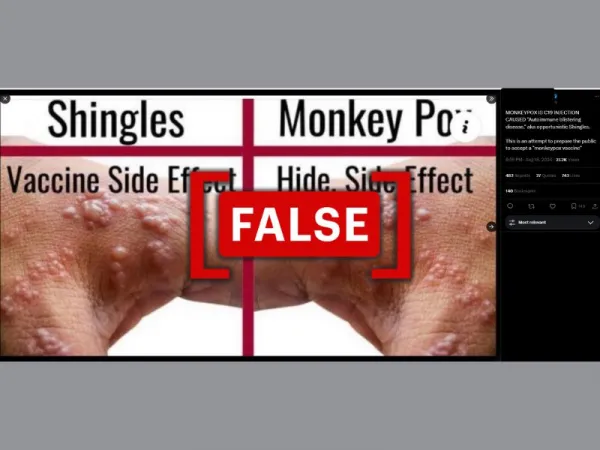By: Nabeela Khan
August 21 2024

The mpox virus causes mpox and was first detected in humans in 1970, before the outbreak of the COVID-19 pandemic.
Claim
Rising cases of Mpox have sparked misinformation on social media, with users claiming that the outbreak is a side effect of Pfizer’s COVID-19 vaccine and that it is an autoimmune blistering disease also known as shingles.
A recent post on X (formerly Twitter) reads, “MONKEYPOX IS C19 INJECTION CAUSED "Autoimmune blistering disease," aka opportunistic Shingles. This is an attempt to prepare the public to accept a monkeypox vaccine.” Similar posts can be seen here and here.
Screenshot of the message circulating on social media. (Source: X/Screenshot)
However, we found that the claim is false. Mpox is a viral illness, not an auto-immune disease, caused by the mpox virus. It was first detected in humans in 1970 and is not a side effect of any vaccination. Moreover, Shingles is caused by a virus called Varicella.
What are the facts?
The posts have shared a screenshot of a document submitted by Pfizer as part of its biological license application to the U.S. Food and Drug Administration (FDA) in 2021, claiming it to be a list of side effects by the pharmaceutical giant listing “autoimmune blistering disease” as one of the side effects of COVID-19 vaccination.
We contacted Pfizer and in an email response, a company spokesperson said, “Mpox is not one of the listed known side effects of Pfizer’s COVID-19 vaccine. The COVID-19 vaccine does not contain any live virus and is completely synthetic.”
“Furthermore, it does not shed any virus transmitting from human to human. With Mpox, human-to-human transmission occurs through close contact with infectious material from an infected person's skin lesions, respiratory droplets in prolonged face-to-face contact, and fomites,” the statement added.
Mpox is an infectious illness that is caused by the mpox virus. It can spread between people through close contact or through things and surfaces touched by an infected individual. It can also spread from an infected animal to a human being. With an uptick in the number of cases of mpox, the World Health Organisation (WHO) declared a public health emergency on August 14.
Dr. Shahid Jameel, India’s top virologist and fellow, Green Templeton College, University of Oxford, refuted the claims made in the viral post and said that mpox is “not the result of COVID-19 or any other vaccine.”
He added, “The infection has been seen in the Democratic Republic of Congo for at least the past decade, and much before COVID-19 came around or its vaccines became available.”
Professor Heidi Larson, founding director of the Vaccine Confidence Project from the London School of Hygiene and Tropical Medicine, also said that mpox is unrelated to COVID-19 vaccination and shingles. "It is caused by a virus and spreads through contact with those who are infected with Mpox.”
What is an autoimmune blistering disease?
According to the National Organisation of Rare Diseases, “Autoimmune blistering diseases are a group of disorders in which the body mistakenly attacks healthy tissue, causing blistering lesions that primarily affect the skin and mucous and membranes.” The exact underlying reason why the immune system malfunctions in individuals with autoimmune blistering diseases is unknown.
“Shingles (also called Herpes zoster) is caused by a different virus called Varicella. Zoster virus (or VZV). It is the same virus that causes chickenpox in children,” Jameel explained.
According to the Centers for Disease Control and Prevention (CDC), “Shingles is a painful rash illness. People get shingles when the varicella-zoster virus (VZV), which causes chickenpox, reactivates in their bodies after they have already had chickenpox.
Verdict
Posts claiming Pfizer's COVID-19 vaccine or any vaccine-caused mpox cases are false. Virologists confirmed that mpox is a viral disease and can not be a side effect of vaccination.